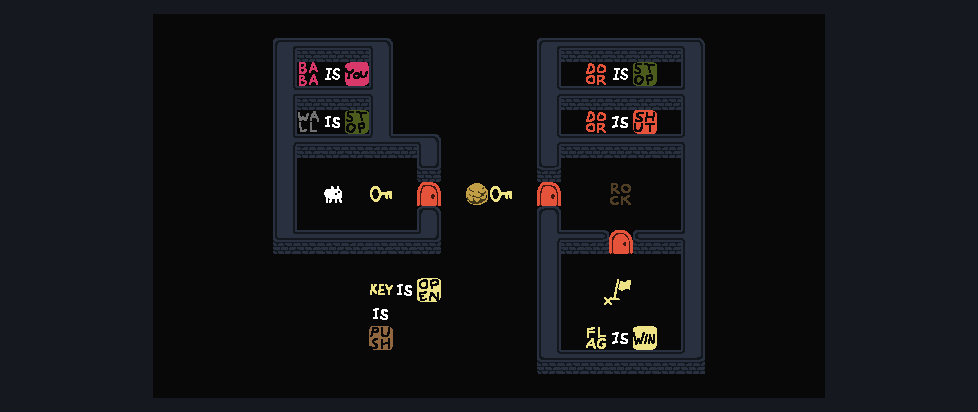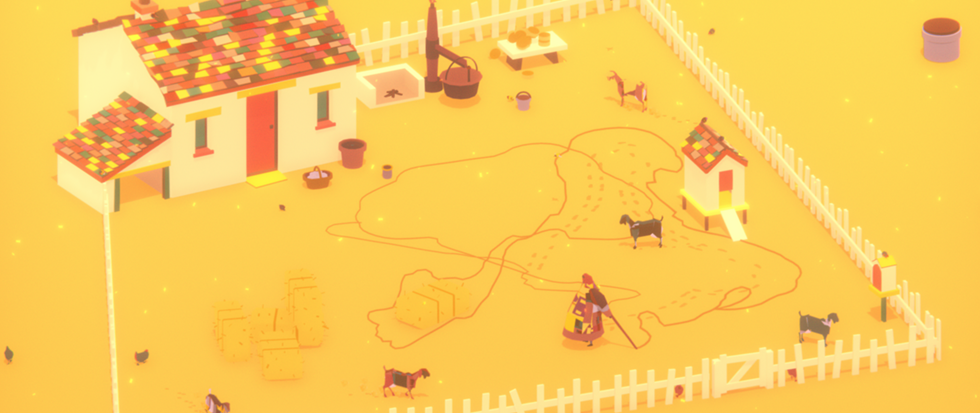
Baba Is You Rules
Block pushing puzzle games have been around for almost as long as video games have. The reason for that, and the reason they work, has everything to do with their internal logic and how you grapple with it. This serves as a solid foundation upon which new mechanics can be sprinkled in as you go. The new mechanics changed the game, but the logic in the background was always constant. If you made the underlying logic of the game manipulatable, though, suddenly new things are possible, and in the player’s hands, will often result in surprising, unexpected results. Baba Is You tests this premise, and comes out the other end as something that looks simple, but is wonderfully multilayered thanks to its manipulable rules.
Baba Is You treats its underlying logic as simply structured rules. Statements like “Baba Is You” and “Flag Is Win” make up the most basic rules that make the game work. “Baba Is You” means that Baba, a small, white sheep-like creature, is what you can manipulate using the directional buttons. “Flag Is Win” means that if you touch the flag, you win the level. Rules like this are extant throughout the levels in the background, but they’re also represented by blocks that you can push and rearrange. Push the You block away from the “Baba Is You” statement and suddenly you’re nobody and can’t continue playing the level, forcing you to back up to where you are extant within the level. Winning the level can be as simple as moving to the flag, or you can reposition the Is and Win blocks to be underneath the Baba block to form the rule “Baba Is Win”, clearing the level instantly.
And of course, many more rules become manipulable over time, including letting you walk through walls, making bodies of water pushable, or even generating a Baba in every empty square on the map. The results can obviously get wild, but there’s an even more base-level logic at play here, and it’s one that’s rooted in literal logic statements and how they’re constructed. You know the order in which these statements are built matters through experimentation, and you know that you can essentially recycle blocks for multiple statements. Learning the logic of the game’s rules is key to solving its puzzles.
And yet this is still a block pushing puzzle game. You still must learn the spacial reasoning it takes to navigate to a win condition. It just so happens that you also must grapple with the logic statements to do that. The constant switching between the two gives Baba is You another dimension that other block pushing puzzle games don’t have. Instead of layering new mechanics on top of a firm foundation, Baba is You weaves them into the foundation as it complicates the spacial reasoning fundamentals required to beat a level. You’re always thinking about how the logic affects the space you’re given to work with, and which axis you need to think about at any given time. Because a change in logic will often unlock what you need to do in the space, and vice versa.
What Baba Is You illustrates is the power of internal logic in games. At a certain point after playing a game, you can assume certain things about it even as things change. The rules of the world are implied and become clear after you play around in it for a while. The only differences with Baba Is You is it codifies these rules into logic statements, then lets you mess around with them. It’s a fascinating peek into how games work and how your assumptions power your ability to play a game. Wrapping your head around the fact that you can change these assumptions at will is difficult to do when you’ve been programmed to accept the implied laws of every fictional universe you’ve ever walked into.
Games, especially puzzle games, are all about discovering the implied rules that dictate the world and navigating them to accomplish your goals. Baba Is You turns that on its head by forcing you to not only understand explicitly laid out rules for the world, but change them to your own ends. It works over your brain in both its logical and spacial reasoning, one dimension more than most puzzle games do. But most of all, Baba Is You shows how the rules the world behaves by shapes how the game plays out, and encourages experimentation with messing with the rules even in stages with only one solution. The game makes you reprogram how things work as well as examine the layout of a stage until you’ve made the rules of Baba Is You your own.




